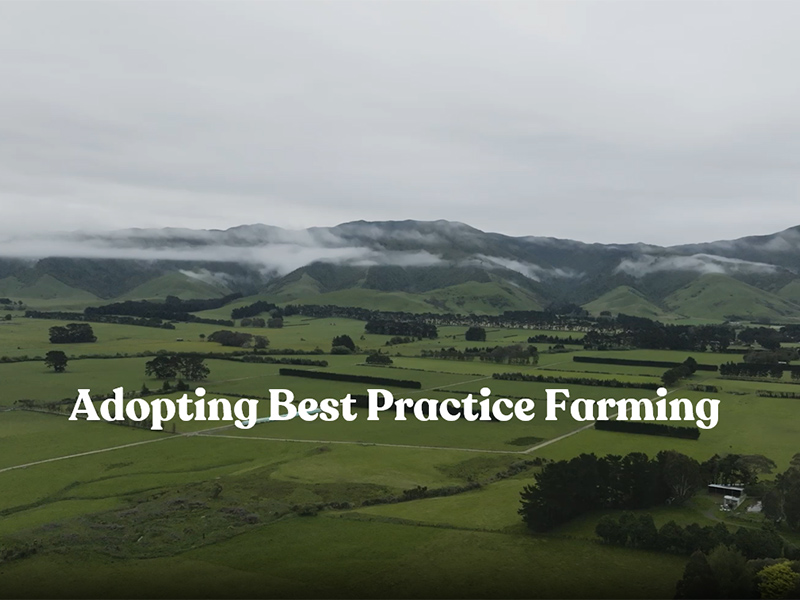Blog
How our on-farm 2030 target benefits our customers
Our on-farm initiatives towards a net zero future set customers up for success
10 Jun 2024
3 min
While our New Zealand farmer owners are amongst the world's most emissions efficient dairy producers, Fonterra’s indirect emissions still make up 93% of our total emissions profile, the majority of which are generated on-farm.
Farming emissions
We've been collecting on-farm data and measuring our on-farm emissions footprint for over a decade. We know exactly what makes up our farming emissions and as the largest source of our emissions.
Our on-farm action plan
Our farming emissions fall under emission scopes 1 and 3. Our target is a 30% intensity reduction in Scope 1 and 3 FLAG GHG emissions from dairy from a FY18 base year. Fonterra’s 2030 targets are science based and are aligned with the Science-Based Targets initiative (SBTi), a global standard for corporate emissions target setting**. Fonterra has submitted its targets to SBTi for validation. Our on-farm emissions target is broken up into the following developments:
7%
Innovating new technologies
- Feed based inhibitors
Working with suppliers, to integrate and validate the performance of feed-based inhibitors like seaweed, botanicals and synthetic compound additives. - Vaccines
Supporting scientific research to develop a vaccine that reduces methane emitted by cows and other ruminants. - KowbuchaTM
Developing and deploying the methane reduction potential of organisms in Fonterra’s dairy and probiotic culture collection as early life or daily does treatments for cows. - Non biological technologies
Supporting the development and validation of technologies that collect methane after it’s been emitted. - Working in partnership
Working in partnership with industry and Government shareholders to accelerate the development and commercialisation of reduction solutions for farmers in New Zealand through the joint venture, AgriZero™.
7%
Best practice farming
- Optimise nutrients from fertiliser
Ensuring fertiliser and manure is applied at the appropriate rate and only in places needed. Storing effluent and recycling nutrients to minimise fertiliser input and reduce costs and emissions. - Improving herd performance
Optimising animal health and reproductive performance to make a sizable impact of farm emissions. New Zealand has an advanced programme of herd improvement via genetic lineage at a national level. The companies that provide genetics to Fonterra farmers have a programme to breed low methane emitting cows. - Delivering the optimal nutrition to cows
Getting the right balance of stocking rate, quality and quantity of feed for the herd to improve a farm’s emissions footprint. What and how much a cow is fed is reflected in the amount of methane produced. - Minimise energy use on farms
Routine maintenance and minimising machinery usage to reduce the amount of energy used in a farming system.
8%
Restoring the land under our guardianship
- Supporting our farmer owners to create forest restoration for areas on their farms where pastoral grazing is not practical, to sequester carbon (the process of capturing and storing carbon dioxide emissions reducing the amount in the atmosphere).
- Work to plant riparian zones (buffer of land beside waterways), increase planting along paddock margins and non-productive land to protect and enhance waterways and habitants.
8%
Land use change
- Fonterra’s emissions include those from the historic conversion of land to dairy farming. These reported emissions will reduce as they are accounted for over time. By 2030, we expect this will enable us to recognise an 8% intensity reduction.
Learn how Fonterra farmer owner Michael Phillips is managing his on-farm emissions through continuously improving on-farm practices:

What these on-farm initiatives mean for NZMP™ customers
We believe that dairy has a regenerative future. We are putting clear plans in place to deliver the on-farm emissions reductions needed to meet our 2030 target. In doing this, we are being transparent with our customers in showing how we can be a part of their own sustainability journey and ambitions, by providing products, solutions, and data to help them achieve their goals.
The Fonterra Climate Roadmap, our 2030 targets, and our 2050 net zero ambition gives our customers confidence they are purchasing dairy ingredients from a supplier that is striving to be the world's leading source of low emissions dairy products.
View Fonterra’s Climate Roadmap: Our strategy towards net zero 2050 below
*Our New Zealand farming system is pasture-based and we're proud that our New Zealand cows are 96% grass-fed and spend more time outdoors than anywhere else in the world. Because we farm with a pasture-based model, we are subject to environmental conditions and there are times when grass growth is low e.g. if we experience a drought. During these times, pasture management practices and/or feeding of supplements may be used. Supplementary feeding ensures cows receive adequate nutrition and animal welfare requirements are met.
**We have submitted our Scope 1&2 and Scope 1 & 3 FLAG targets to SBTi for approval.
1. Also known as biogenic methane (i.e. methane produced in the bovine rumen).
2. Nitrous oxide emissions including but not exclusively from excreta and nitrogen fertiliser use.
3. For example, but not limited to, Maize Grain, Molasses, and Palm Kernel Expeller.
4. "Other" emissions comprised of electricity (0.5%), replacements (0.6%), on-farm fuel (0.9%), cow wintering off (1.2%), refrigerant (<0.1%) and pesticides (<0.1%).
Illustrations represent our New Zealand on-farm emissions only. Environmental data reporting methodologies are outlined in the Fonterra Sustainability Report 2023: Fonterra - Sustainability Report 2023 - Page 91 https://view.publitas.com/fonterra/2023-sustainability-report/page/91



